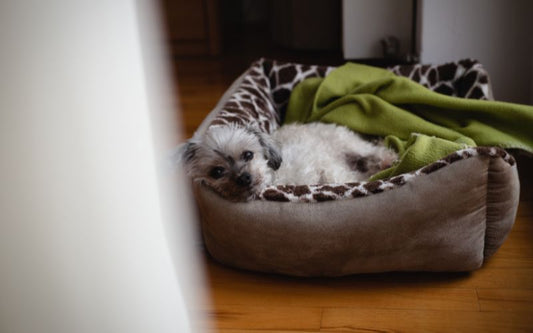A good night's sleep is super important for our health and wellbeing, and any disruption (no matter how cute and cuddly) can be frustrating.
If your dog is going through a phase of night time barking, read on to understand why this could be happening and what you can do to help settle them:
- Why do dogs bark at night?
- Why has my dog started barking at night all of a sudden?
- Is it normal for puppies to bark at night?
- 7 tips to help your dog stop barking through the night
- UK law on dog barking

Why do dogs bark at night?
Unfortunately there isn’t one set answer as to why dogs bark at night, but there are several common factors that could be triggering the barking, the first being noises.
A dog's hearing is much stronger than humans. Dogs can hear the same sound we hear from four times the distance, so through the night they'll be picking up on noises that you won't hear, especially if you live in the peaceful countryside.
Whether it's the resident fox wandering through your garden, a bird nesting in the trees, or someone walking home late at night, these sounds are likely to cause your dog to start barking at night.
If you live in a neighbourhood full of dogs, you may experience group barking - which happens when a dog hears another dog barking at night and starts to join in. Group barking occurs because dogs are pack animals, reacting and communicating with each other through barking to warn of potential intruders.
Sometimes however, dogs may simply bark out of boredom or loneliness.
Why has my dog started barking at night all of a sudden?
If your dog has suddenly started barking at night, it's more than likely that there will be a reason for it. Factors that cause dogs to start barking are usually linked to their environment, behaviour or sometimes even a medical condition.
Dogs have more heightened senses:
Not only can they hear better than us, but they have an amazing sense of smell too, so the likelihood of anything getting past them is slim.
Whether you live on a busy road with cars driving past, amongst open fields with wildlife around, have neighbours who set off for work during the night, or you simply have a noisy boiler, their instincts will kick in to defend their territory and warn you of potential intruders.
Barking for attention:
After two years of intermittently working from home, many of us will have spent increased amounts of time with our four-legged friends than we would’ve previously been able to. So it’s no wonder that more and more dogs are suffering with separation anxiety, getting nervous or frustrated if we leave them alone.
This counts for bedtime too - so if you’re slowly trying to get back to your pre-covid sleeping routine and stop sharing your bed with your pooch, it’s best to ease them in gently.
Boredom:
Alternatively, if they’re not showing signs of separation anxiety, your dog could be barking out of boredom. It’s important to make sure they get the right amount of physical and mental exercise during the day, through a combination of walks and play sessions, so they’re not left with pent up energy before bed.
A sign of sickness:
Sudden nightly barking could also be a sign that your pup is uncomfortable or unwell. If they’re drinking more water than usual (especially as the days are getting warmer), or they’ve eaten something that’s upset their stomach, they could be waking you for the toilet.
If your pup is in their senior years, their body will be slowing down and their health may start to deteriorate. This can bring with it lots of aches and pains, uncomfortable sleeps and a number of disturbed nights all round.
Is it normal for puppies to bark at night?
It’s very normal for new puppies to bark at night. They’ll be used to going to sleep with their mum and siblings around, so the first few weeks in a new home can be a big, often very scary, change causing feelings of worry and concern.
💡 Top training tip: Get your pup used to sleeping in a crate - even if it’s just for the early months!
Crates provide a safe, enclosed space for your puppy to settle and are great while you’re training your dog. Start with the crate close to your bed, so your new pup can see you (this way you’ll be able to hear if they need to go to the toilet at any point too, it’s inevitable in the first few weeks).
You can then gradually start to move the crate further and further away, and if you don’t want them in your room forever, eventually move the crate to the intended room you want your dog to sleep.
Remember it’s a process, go easy on them and they’ll soon learn the crate is a safe space to settle down.

7 tips to help your dog stop barking through the night
1. Play classical music or white noise.
White noise isn’t just great for helping babies and adults sleep - it works well for dogs too!
Helping to reduce cortisol levels and ease anxiety, it’s a great thing to try if you need to get your dog to stop barking at night.
2. Release any pent up energy with an evening walk or play session
Making sure your dog is stimulated enough throughout the day is really important and will help with getting them to be quiet at night.
Whether you choose to introduce an evening stroll to their routine, make time for a a mini training session to practice their tricks and get their brains working, or choose a pre bedtime play date with their favourite toy to let the zoomies out, these are all ways to help your dog get a peaceful night sleep.
You could also let them take their favourite toy to bed (if that has a calming effect on them), but maybe hide the squeaky toys if you actually want some sleep!
3. Try a calming treat or aromatherapy aid.
It’s even possible to invest in CBD products produced specifically with canines in mind. With the top-pick of CBD oil for dogs, you’ve got vet-approved (US only) solutions to produce a calming effect.
4. Give your dog a comfier sleeping space.
If your dog’s barking is due to discomfort, it may be time to switch up their sleeping arrangements.
Whether that’s investing in a cosy new bed, a bigger crate, or simply letting them sleep in your bedroom, a new set-up could help encourage a quiet night sleep.
5. Give them an evening pamper session.
Whether that’s a little doggy massage to soothe any aches, or a daily detangle with a gentle brush, by creating a night time routine, you will help your pup learn what's expected of them when it’s time to wind down and get ready for bed.
6. Work with a dog trainer.
We know this is an expensive option, but if you don’t seem to be able to get a handle on your dogs night time barking, it might be worth getting some help.
Dog trainers can provide one-on-one support to really get to the bottom of what’s causing the issue. They can then work closely with you and your dog to find a solution that works best.
7. This may be the hardest one, but resist the urge to go to a barking puppy or dog.
The last thing you want is to teach your dog is that their barking will bring you running.
They need to learn that barking at night isn't behaviour you approve of, or want them to display.
Even talking to them with soothing words in an attempt to comfort them can encourage the barking to continue, so it’s best to stay quiet and ride through the pain. Eventually, they will stop when they realise their strategy is no longer working.

What does UK law say about dogs barking at night?
We all know how disruptive a barking dog can be, and as uncomfortable as it is for you as an owner to experience a sleepless night, it can be a lot worse for your neighbours.
The Environmental Protection Act 1990 states that a barking dog can be classed as a ‘statutory nuisance’ and owners could face a fine of up to £5,000 if they don’t curb the behaviour.
If someone in your neighbourhood complains, the local authority has a responsibility to investigate the issue and take formal action if needed.
As a dog owner, it's important to be aware of the most recent UK dog laws and how they relate to you and your pup.


